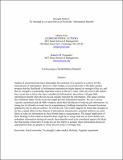Strength matters: Tie strength as a causal driver of networks’ information benefits
Author(s)
Kim, Minjae; Fernandez, Roberto M
DownloadFernandez_Strength Matters.pdf (244.1Kb)
PUBLISHER_CC
Publisher with Creative Commons License
Creative Commons Attribution
Terms of use
Metadata
Show full item recordAbstract
Studies of social networks have often taken the existence of a social tie as a proxy for the transmission of information. However, other studies of social networks in the labor market propose that the likelihood of information transmission might depend on strength of the tie; and that tie strength is a potentially important source of the tie's value. After all, even if job seekers have social ties to those who have valuable job information, the seekers will gain little information benefit when the ties do not actually transmit the information. This paper clarifies the conditions under which social ties might provide information benefits. We use a survey vignette experiment and ask MBA students about their likelihood of relaying job information via strong ties (to friends) or weak ties (to acquaintances), holding constant the structural locations spanned by the tie and job seekers' fit with the job. The results support the claim that strength of tie has a causal effect on the chances of information transmission: potential referrers are more likely to relay job information to their friends than to acquaintances. The larger implication of these findings is that whatever benefits there might be to using weak ties to reach distant non-redundant information during job search, these benefits need to be considered against the likely fact that people connected via weak ties are less likely to actually share information about job opportunities than are people to whom the job seeker is strongly tied.
Date issued
2016-11Department
Sloan School of ManagementJournal
Social Science Research
Publisher
Elsevier BV
Citation
Kim, Minjae, and Roberto M. Fernandez. “Strength Matters: Tie Strength as a Causal Driver of Networks’ Information Benefits.” Social Science Research 65 (July 2017): 268–281.
Version: Author's final manuscript
ISSN
0049089X